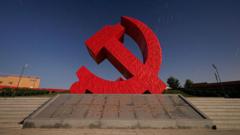The United Front Work Department (UFWD) in China, often hailed as the country's "magic weapon" by figures such as Mao Zedong and Xi Jinping, is generating significant concern in Western nations akin to worries surrounding China's military advancements. The UFWD is currently under investigation amid allegations of espionage, particularly involving overseas Chinese individuals, such as businessman Yang Tengbo, who has gained notoriety for associations with high-profile figures like Prince Andrew.
Despite its well-documented history as an arm of the Chinese Communist Party, the UFWD's influence has accelerated under Xi Jinping's leadership. Initially focused on uniting various communist factions during the Chinese Civil War, the UFWD has evolved over the last decade to actively engage overseas Chinese communities, aiming to sway public discourse on contentious matters, including Taiwan's status and human rights issues in regions like Xinjiang and Tibet.
Experts delineate the United Front's work which frequently overlaps with espionage yet extends to concerted efforts to engage overseas Chinese citizens in proactive narrative-building that portrays China favorably. Such actions contribute to a complex matrix where promoting Chinese interests can blur into espionage, complicating international relations.
Yang Tengbo, currently contesting sanctions from the UK amidst espionage claims, exemplifies recent cases drawing attention to the department’s methods. In addition, other instances have emerged, such as British lawyer Christine Lee and US citizen Liang Litang, both of whom have faced accusations of espionage activities linked to the UFWD, enhancing the discourse on the thin line between influence and interference.
As scrutiny over these activities intensifies, nations like Australia and the US have initiated stricter foreign interference laws and measures to counteract alleged missions enacted by the UFWD. However, the Chinese government vehemently dismisses these claims as unfounded, insisting that such laws hinder diplomatic relations.
Experts advise a balanced approach; while acknowledging the risks posed by the UFWD’s operations, they also caution against racial profiling of ethnic Chinese individuals as potential threats, stressing the importance of maintaining trust and cooperation within these communities.
As the world grapples with the implications of China's increased diplomatic assertiveness and foreign influence strategies, the activities of the United Front Work Department remain a pivotal focal point in understanding and addressing these challenges on the global stage.



















